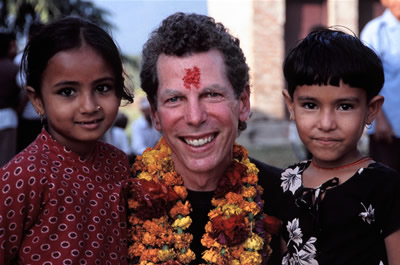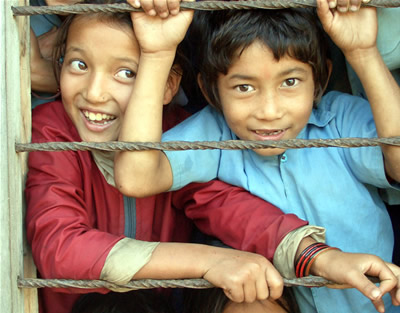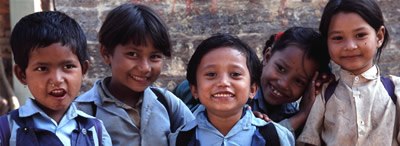Giving Girls Hope
Counseling Professor Offers Scholarships to Students Who Have no Means to Receive Education
March 1, 2007
By Mimi Ko Cruz
Faced with starvation, infectious diseases, illiteracy and poverty, parents in Nepal sell an estimated 7,000 of their daughters into sex slavery each year.
“Young girls are sold by their families because they can’t afford to feed them or keep them in school,” said Jeffrey A. Kottler, chair and professor of counseling, who has diverted more than 40 girls from possibly ending up in brothels where they most likely would contract AIDS.
 |
Because of his efforts, the 8 to 12-year-old girls are studying in schools in three villages in Nepal. The girls are supported by the Madhav Ghimire Foundation, which was created in 2001 by Kottler and a former student, Kiran Regmi, who is an obstetrician and researcher in Nepal. The foundation sponsors the children. It costs $50 a year to educate, clothe and feed one student.
The nonprofit organization is named in honor of Nepal’s poet laureate, Madhav Ghimire, who is considered a living legend. His poetry addresses such issues as social consciousness, compassion, courage, hope and vision.
Regmi, Ghimire’s daughter, is one of the few female doctors practicing in Nepal. She is doing research on the high maternal mortality rate in that country, where the life expectancy is 57 and 90 percent of the population has no access to health care.
According to the U.S. Agency for International Development, the first case of HIV in Nepal was reported in 1988 and nearly 60,000 people were infected with the virus by 2003. It is predicted that AIDS will become the leading cause of death among the nation’s 15- to 49-year-olds in the next decade.
That crisis paired with the high number of illiterate girls (76 percent of females 16 and older in Nepal were illiterate in 2003, according to the United Nation’s State of the World Population Report) makes Kottler’s intervention work urgently needed, Regmi said.
She called the foundation’s work “a holy mission,” one that ought to be revered for it’s humanitarian purpose.
 |
Kottler “worked hard for the establishment of this foundation,” Regmi said. “The major donations of this foundation are from the U.S. with his initiation. He visits every year to evaluate the progress and nurtures with his vision and dedication.”
Kottler travels to Nepal every winter, carrying donations from his family, friends and CSUF colleagues and students. This year, he raised $10,000, and the entire sum is being used to put more girls in school. The 56-year-old professor, a prolific author who has penned 65 books, takes groups of fellow faculty members and students with him and conducts workshops on counseling, psychology and education.
“We go into remote villages and tell the families, ‘your girls are very valuable and we’re going to support them,’ ” Kottler said, adding that a public ceremony is held each year as new students are awarded scholarships.
“When I go to Nepal and see the faces of these children who need so much help, it feels like what I do is important,” he said. “This is a part of the world that is so neglected that I feel I have to do something and this is the most important thing that I do because I can see how it changes people’s lives.”
Kottler said that when he learned that families were selling their daughters into sex slavery, he was so horrified that he felt compelled to try to curb the number of such cases.
“That’s why I started the foundation,” Kottler said.
The foundation identifies the girls of the lowest caste who are most at risk of being sold and selects them for the scholarships, he said.
For example, one of this year’s scholarship recipients is a girl whose father was killed be a tiger and whose mother owns no land, has no way to grow food and is totally dependent on her neighbors, Kottler said. “The only way the girl could stay in school is with our support, and she is an excellent student.”
Another scholarship recipient, he said, wants to become a pilot. “She has never seen a plane before, only one flying above her village, but she decided that some day that’s what she wants to do,” he said, adding that he is moved by each student’s story so much that his desire to help continues to grow.
 |
“Dr. Kottler is an inspiration to his colleagues and his students because he puts his heart into his work, especially in Nepal, where the need for his charity is so great,” said Roberta Rikli, dean of the College of Health and Human Development.
“He sincerely wants to make a difference in the world and he is making an impact,” added Matt Englar-Carlson, assistant professor of counseling, who traveled to Nepal with Kottler two years ago.
One of Kottler’s graduate students, Jane Kinsley — who traveled to Nepal with Kottler two months ago — agreed.
The journey “was life changing,” the 58-year-old counseling major said. “I’ve always traveled as a tourist, first-class, but this experience was so different and very special. I went over there thinking we’re going to help these people who are so poor. Then, I met them and they have such a sense of who they are. They are content with so very little and the children had tears in their eyes because they will get to go to school. I walked away from Nepal thinking, ‘which one of us is richer?’ ”
For more information about Kottler’s Nepal charity, visit www.ghimirefoundation.org.



 Produced by the Office of Public Affairs at California State University, Fullerton.
Produced by the Office of Public Affairs at California State University, Fullerton.